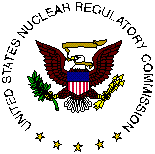Two steps to another Nuclear Accident
The most troublesome safety issue may be that "retail wheeling" exacerbates a condition where nuclear plants are only two steps from a serious accident. These concerns are currently being voiced by former Nuclear Regulatory Commission Chairman Dr. Shirley Ann Jackson.
Here's how deregulation can lead to an accident:
The electrical grid may become unreliable because the intricacies of transmission of electrical power have not been completely worked out. When the grid fails, a nuclear plant shuts down (unless operating at low power). The reactor trips and the plant stops producing electricity.
But, because the grid has failed, there is no offsite source of power to operate the equipment necessary for bringing the reactor to a safe shutdown.
Nuclear plants rely upon their own diesel generators in such a situation. However, these generators are unreliable. For example, just a few years ago Three Mile Island's diesel generators were inoperable for three months and nobody knew it.
Even without diesel generators, coolant can be circulated by steam-powered pumps. A bank of batteries supply power to the control room and the valves that will permit that operation. The batteries will only last four hours. At the end of that time, if power on the grid is not restored, the reactor will go completely out of control and experience a "beyond design basis accident."
Since the emergency sirens in surrounding communities will be unable to sound, a full scale accident may go unpublicized for hours with little or no warning to take protective action. It is unknown if electronic media will be able to broadcast warnings to the citizens who have battery operated radios or televisions.
Just last year, a huge part of the western United States electrical grid totally collapsed for more than 10 hours. Four nuclear plants were automatically shut down. Two experienced complications. It is a difficult situation which tests the safety equipment. Fortunately the diesel generators supplied power for the time needed to restore the grid.

Former NRC Chairman Dr. Shirley Ann Jackson talks about the dangers:
"Another area of concern to the NRC is electrical grid reliability, or security. NRC reviews in recent years have left no doubt that a Station Blackout at a nuclear power station is a major contributor to reactor core damage frequency. Events of this type are defined as Loss-of-Offsite-Power events, coupled with the inability of the onsite emergency diesel generators to provide power to necessary plant safety equipment. Although Station Blackout events have been extremely rare to date, there have been a number of Loss-of-Offsite-Power events. There also have been instances where diesel generators at plants have not been operable for periods of time. Therefore, the possibility of a Station Blackout is of concern to the NRC.
"In 1996, two electrical disturbances (within a five-week period) on the Western Grid caused 190 plants to trip off-line, including several nuclear units. Nuclear plants are designed to withstand unexpected trips. However, events of this type cause unnecessary challenges to plant safety systems. Of course, the nuclear plants themselves are an important element of maintaining electrical network stability.
"In reviewing these events, the Western Systems Coordinating Council listed the following contributing factors: high Northwest transmission loads; equipment out of service; inadequate maintenance of right-of-way; operation in a condition in which a single failure would overload parallel lines, triggering cascading outages; communication failures to neighboring utilities, prior to the disturbances; and no response to earlier events.
"Therefore, from the perspective of a nuclear safety regulator, the NRC is convinced that economic deregulation must proceed with a sensitivity to, and an understanding of, the vulnerability of nuclear plants to Loss-of-Offset-Power events. This means that transmission network governance structures must reflect that standards of performance, operational criteria, and training of personnel are critical oversight issues, which all must be factored in, and properly addressed, as deregulation proceeds. Whatever form network governance structures assume, their authority needs to be strong enough to assure that these considerations are enforced."
NRC Admits Faulty Enforcement Practice
"NRC staff has identified design and configuration control deficiencies at a number of plants, that raise questions about whether licensee programs are sufficient to demonstrate that plant physical and functional characteristics are consistent with the established design basis, and whether plants are being maintained and operated in accordance with their design basis. These configuration control problems are of concern because of their potential impact on public health and safety. It is imperative that safety systems respond, as designed, to challenges from off-normal or accident conditions. The NRC believes that reliance on the industry's past voluntary efforts to maintain design-basis information may not have been sufficient to ensure configuration control at a number of plants."
Former NRC Chairman Dr. Shirley Jackson - April 1, 1997
|